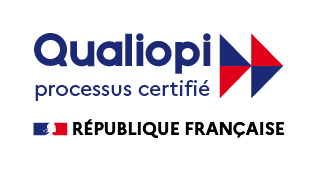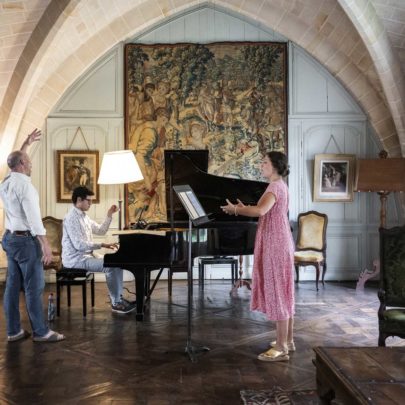Period
July 13 to 31, 2026
Presentation
At the crossroads of poetry and music, the melody and lied genre is one of the richest and most intimate, but also one of the most demanding, requiring a very special alchemy between singer and pianist.
The new Campus mélodie-lied gives prizewinners the opportunity to spend 3 weeks working on linguistic, literary and musical projects, and to discover this extremely vast repertoire.
For this first three-week edition, each week will feature a different master duo, chosen from among the greatest recitalists on the international scene: Barbara Hannigan and Bertrand Chamayou, Stéphane Degout and Simon Lepper, Bernarda Fink and Susan Manoff.
The training of the laureates is enriched by introductory courses in art history, enabling them to establish links between the museum’s collections and the musical repertoire. Joint activities will also be organized with other trainees at the abbey: improvisation between music and dance, debates and reflections on the human sciences.
For the young laureates, the Académie represents a professional integration program that will enable them to make a name for themselves with the public and programmers through a series of concerts, presentations and masterclasses at Royaumont and elsewhere.
Teachers
Duo 1
Barbara Hannigan and Bertrand Chamayou: 5 days from July 14 to 18
Duo 2
Bernarda Fink and Susan Manoff: 5 days from July 21 to 25, 2026
Duo 3
Stéphane Degout and Simon Lepper: 5 days from July 27 to 31, 2026
Terms and conditions
Audience
5 piano / vocal duets
Prerequisites and conditions of access to training
- Be a young professional singer and/or instrumentalist in the final stages of higher education.
- Participants formally agree to follow the entire campus.
- The conditions of access are transmitted during the training.
Duration
1 Session from July 13 to 31, 2026
- July 13: day at the Musée d’Orsay (2:00 pm to 6:00 pm)
- July 14 to 18 (5 days) : Duo 1 | Barbara Hannigan and Bertrand Chamayou
- July 19: Off
- July 20: day at the Musée d’Orsay (2:00 pm to 6:00 pm)
- July 21 to 25, 2026 (5 days) : Duo 2 | Bernarda Fink and Susan Manoff
- July 26: Off
- July 27 to 31, 2026 (5 days) : Duo 3 | Simon Lepper and Stéphane Degout
Total: 20 days (including 2 days off) – 126 hours
departure on 1/08 morning
Rates
Application
Pre-selection on file then audition
Pre-selection on the basis of applications by the teaching team:
- Photo (max: 100MB)
- 1 or more video files related to the chosen course (please note that WeTransfer links will not be uploaded)
- Cover letter
- Short biography (600 characters including spaces)
- CV
Calendar
Submission of applications
- Application deadline: Sunday, October 12, 2025 (except for US auditions for the Lied program : Sunday, September 28, 2025).
- Stage 1: Pre-selection based on application
- Stage 2: Shortlisted candidates will be invited to an audition (see below)
- Final answer: from January 6
Auditions
- October 05, 2025: Houston (USA)
- October 8, 2025: New York (USA) at the National Opera Center
- November 24 and 26, 2025: Paris (8th) at La Grange-Fleuret music library
- November 25, 2025: London (UK) at Wigmore Hall
- November 27, 2025: Berlin (Germany) at the “Hanns Eisler” Hochschule für Musik
All Royaumont Foundation training programs have a minimum lead time of 11 working days.
Example: if the Royaumont Foundation validates the registration request on June 14, it can offer the beneficiary a course starting on June 29.
Fiche programme
version n°1 dated 05/2025
Validity of version n°1: 1 year renewable
Course description/content of the training
This new one-session program will combine theoretical and practical approaches, in the form of experimental workshops, creative phases, seminars, meetings, lectures and role-playing situations, with the main theme of this second edition: From solo form to collective project.
| Day 1 | Afternoon: Welcome of beneficiaries at the Musée d’Orsay In the company of the director or artistic director of the Pôle Voix et Répertoire, Catherine Huet (administrator of the Pôle Voix et Répertoire), Armelle Mousset (production manager), and the lecturers; tour de table of the beneficiaries, presentation of their backgrounds and their expectations concerning the training. Presentation of the campus, the Fondation Royaumont | > Face-to-face welcome with all training participants. > A group meeting with beneficiaries, trainers and the training manager. |
| Days 1 to 4 | Day of classes at Royaumont 10:30am-1pm: duo classes, detailed work on each work, definition of aesthetic and technical specificities 2:30pm-6pm: group classes, detailed work on each work, definition of aesthetic and technical specificities | > Sessions led by the speakers |
| Day 5 | Full day of classes at Royaumont 10:30am-1pm: duo classes, detailed work on each work, definition of aesthetic and technical specificities 2pm-4:30pm: group classes, detailed work on each work, definition of aesthetic and technical specificities | > Alternating lessons in pairs and personal work, followed by group lessons. > Sessions led by the speakers. |
Number of traines minimum / maximum
Floor: 4 piano duets & vocals
Ceiling: 5 piano duets & vocals
Educational objectives
Knowledge
- Understand a sung text in its literal meaning as well as its subtext
- Integrate the pronunciation of sung texts in one’s mother tongue as well as in foreign languages
Expertise
- Acquire the technical tools needed to interpret a repertoire, and know when and how to use them.
- Work and search in the music library: find a specific work or search for lesser-known works to perform, identify an edition and its relevance to a composer’s work.
- Take into account information provided by an art historian to refine your interpretation of a work of art
- Define one’s own interpretation of a work, based on advice from supervisors
soft skills
- Hearing and understanding managers’ requests and musical suggestions
- Clearly express musical intentions and justify them
- Adapt to the demands of a repertoire (pronunciation, musicality of a language…)
- Share your interpretation with an audience during the final performance
Targeted competencies / operational objectives
- Learn the specific repertoire of French mélodie and German Lied.
- Learn more about German and French prosody…
- Analyzing poetic texts
- Learning to design a mediation
Methods used
Teaching aids :
- Practical, face-to-face teaching in the form of performance classes given by the main instructor in small groups or collectively, depending on the repertoire covered.
Courses are given in English, German or French. - A public presentation at the end of the training course, in the form of a masterclass, a presentation of the entire body of work performed, etc.
All participants are invited to attend, without remuneration.
Technical resources available :
- The rooms are spacious, equipped with music stands (solid or folding), chairs or stools suitable for musicians (without armrests) and the instruments required for training.
- Beneficiaries bring their own instruments and scores, which are not supplied.
- Outside lesson times, rehearsal spaces can be made available free of charge, on request and subject to availability.
- The abbey monument in its entirety (rooms and gardens)
- Documentation via private Drive
Monitoring and evaluation methods
Before training :
- Pre-selection on the basis of an application file (via the platform…) by the educational director, using a questionnaire to identify the needs of the beneficiary.
- Assessment of professional level through biography, copies of awards and diplomas, and audio and/or video file.
During classroom training :
- During face-to-face training: Evaluation of the beneficiary’s reactivity and ability to quickly integrate the trainer’s proposals.
- During the presentation at the end of the training: performance of one or more works in a real-life situation in front of an audience enables you to appreciate the evolution of your interpretation, as well as your emotional and physical postures.
The interview is used to evaluate and guide career choices.
The following are some of the observations made by the beneficiary:
- the quality of physical and gestural ease,
- the relevance of interpretation in relation to historical and musicological analysis,
- accuracy and coherence within the ensemble,
- the relevance of work techniques,
- taking into account the spatial and acoustic configuration of the site,
- the quality of the relationship with the public.
The beneficiaries sign a sign-in sheet for each half-day.
At the end of training
A certificate stating the objectives, nature and duration of the course, and the results of the training assessment, is given to the beneficiary, along with the certificate where applicable.
Qualitative assessment methods
The beneficiary fills in a qualitative evaluation form to assess the artistic, pedagogical, human and material aspects of the training.
Concerts outside the training programme enable us to monitor the development of the beneficiary’s career after the training, and in particular to assess the quality of the performance and the number of concerts given.
A post-training follow-up is established, for which beneficiaries are asked to inform us within six months of the end of the training programme of any contracts they have obtained.
Accessibility and consideration of disability situations
The Royaumont Foundation has made the acceptance and participation of people with disabilities a strong commitment to its project. Our training courses are open to people with disabilities and different arrangements can be made according to the specificities of each course. To discuss your needs, please contact us when you register.
The Foundation has :
- Rooms accessible by elevator.
- Screen equipment and amplified speakers.
- Catering on the first floor.
Contact
Pedagogical manager
NN Artistic Director of the Pôle Voix et Répertoire
François Naulot, ad interim
Administrative referent
Catherine Huet Administrator, Pôle Voix et Répertoire
c.huetl@royaumont.com
Logistics referent
Armelle Mousset production manager, Voice and Repertoire Department
Disability referents
Samuel Agard and Doriane Trouboul
referenthandicap@royaumont.com
VHSS referent
vhss@royaumont.com
Royaumont Campus 2026

